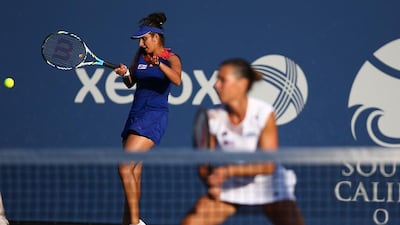Sania Mirza has stopped playing singles tennis. This is not actually news because she took the decision back in April 2012.
Even in India not many people seemed to take notice of it. It passed me by completely, so much so that when Mirza was in Abu Dhabi recently, as a brand ambassador for a fitness club, I made the mistake of asking her what the future of her singles career was.
“I haven’t played singles in more than a year, so yes, it’s over,” she said. “I’ve said that many times.
“I’ve had three surgeries and its tough for me to come back. My body was just giving in. It’s the toughest choice I have had to make in my career, but I love tennis too much and wanted to play tennis for a few more years, rather than stubbornly persist with singles and give up in just one year. I’d rather succeed and do bigger things in doubles.”
If her results this year, the first full year she has played only doubles, are anything to go by, it has been a great decision.
She won five titles across the world, in Australia, Dubai, the US, Japan and China. In fact, her partnership with an old friend, the Zimbabwean Cara Black, ended the season as the form pairing in doubles, having won titles in succession in Tokyo and Beijing.
Last month Mirza broke into the top-10 doubles rankings for the first time, jumping from 11th to ninth, a position she still holds. But for her having three different partners this year – a situation out of her control – she would likely have participated in the WTA end-of-season championships in Istanbul.
This is the thing about doubles, though. Mirza says it was the toughest decision of her career to give up singles but it was probably easier for her to take that decision as an Indian tennis professional rather than one from, say, eastern Europe or the US.
As Mirza pointed out, in the subcontinent and Asia, doubles play still has some standing. That is understandable, given that the only grand slam successes India has had has come from doubles specialists Leander Paes and Mahesh Bhupathi; in as tennis-dry a landscape as Pakistan’s, Aisam-ul-Haq Qureishi is a star because he has built a relatively successful doubles career.
“In the subcontinent doubles tennis does get the recognition,” Mirza said.
“I’ve played singles for a long time and done well, but a lot of the men’s doubles players have played only doubles and made a living out of it and are superstars. So yes, I do think in Asia and the subcontinent doubles play is very appreciated.”
Doubles tennis has lost a bit of lustre in recent years around the world.
Everyone knows – and most love – the Bryan brothers, Bob and Mike.
They are probably the greatest doubles team to step on court. But how many people have even heard of Bruno Soares and Alexander Peya, currently the second-ranked pair in men’s doubles (and nearly 7,000 points behind the Bryans)?
So why is there less emphasis on doubles in the modern era?
A big reason for this is precisely because the top singles players have stopped playing in doubles, because the schedules have become too demanding to maintain.
That has allowed specialist doubles players to take over, which effectively means that if you have a singles circuit as intense and of as much quality as the men’s tour right now, a lot of the doubles specialist are unknown.
John McEnroe is a legend of the singles game, but he was also a wonderful, successful doubles player, and remains a strong advocate for it.
This past summer, even he felt the game was clinging on for dear life.
“I think, first of all, the Bryans are doing a great job trying to prop up doubles,” McEnroe told the Fort Worth Star-Telegram. “Without them it would be in even worse shape than it is.
“As far as doubles, it’s on life support. At this stage, it’s been proven by the singles players that there is no real advantage for them to play doubles.
“Roger [Federer] doesn’t play much doubles, although I think it propelled him to a US Open win in 2008. When he won the doubles at the Olympics, it gave him confidence using some net play that he took advantage of winning the Open that year.”
osamiuddin@thenational.ae
Follow us on twitter at @SprtNationalUAE

